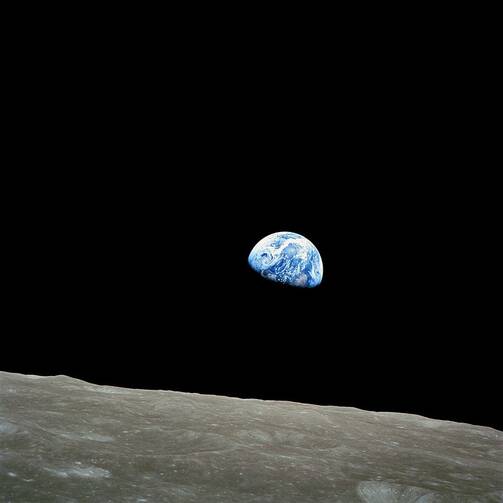On Dec. 24, 1968—Christmas Eve—the three astronauts of Apollo 8 were circling the moon, a practice run for the eventual lunar landing that had been President John F. Kennedy’s goal for the nation. It would happen within the next seven months, in July of 1969. But in this space flight of Apollo 8, the act of actually getting close to the moon’s surface was a momentous achievement in and of itself. It proved that all the work, sacrifice and dedication were coming close to a fruition.
Given what day it was, the three astronauts thought it appropriate to recite verses from the Book of Genesis. Astronaut Bill Anders started, saying, “We are now approaching lunar sunrise, and for the people back on Earth, the crew of Apollo 8 has a message that we would like to send to you. ‘In the beginning, God created the heavens and the earth…’” The other astronauts, Jim Lovell and Frank Borman, continued reading the passages from Genesis that were so familiar to people of the book.
Frank Borman finished the recitation with the lines, “‘And God called the dry land Earth; and the gathering together of the waters called he Seas; and God saw that it was good.’” With that, Borman closed with this greeting to his fellow human beings back on Earth: “And from the crew of Apollo 8, we close with good night, good luck, a Merry Christmas—and God bless all of you, all of you on the good Earth.”
In what was the most watched telecast for the time, the Christmas greetings from outer space provided the astronauts’ fellow humans a rare gift: a look at their common home as it really was, a fragile, luminous gem that was the gift of God.
When the astronauts of Apollo 8 went on that preparatory mission for the eventual lunar landing, they, like their terrestrial brethren, had no idea how beautiful planet Earth actually was. And that marble-blue sphere that resided in the vast blackness of space was the home of the human race; it was a sobering and breathtaking thought.
The beauty of the planet, however, did not reveal how difficult and rough existence actually was on Earth; that year, 1968, was a year of convulsions: war, assassinations and dissent. The multitude of problems that existed showed how beset the human condition was at the time (and regretfully, still is). And yet, on that night, it was there for the astronauts and all humanity to see: a simultaneously beautiful and fragile planet.
It is worth recalling that night of 1968, for it revealed the Earth as it was to ourselves: despite its exquisite beauty, the planet had, as well, as its intractable problems. Reflection upon that Earth eventually led to the first Earth Day—in 1970—and it is an event which we still commemorate many years later, through event, programs and community activism.
It is worth noting that Pope Francis is concerned with things not only of the heavens but also of the Earth. It is perhaps a touchstone of his papacy—his emphasis on our planet Earth. This is not to say that other popes have not been influenced or affected by the plight of the planet; it is just that to Francis, how we care for “our common home” says much about how we view the Lord’s charge to be stewards of his creation.
In his two great documents, “Laudato Si’” and “Amoris Laetitia,” Pope Francis is concerned about our environments—in the plural—both the earthly, physical one and our spiritual one. For him, both are interconnected and inseparable. Coming from South America, he knows the third world as well as the first and he is greatly concerned about the environments in which we live. For him, the crucial matter is how we live on the planet God the Father bequeathed to us. Though we may be stewards of His creation, we are not the masters of it. We do not “own” it; it is given to us and it is up to us to give it to others who come after us.
At the same time, Pope Francis is concerned with our spiritual environment; do we live Gospel values in a broken and hurting world? Do we believe, do we have faith and do we care? No one person can be responsible for the conditions we find ourselves in; the conditions in which we live are the result of the actions of many persons that make up our society—and that is all of us. Our spiritual lives cannot be separate from our physical lives; to emphasize one to the detriment of the other denigrates both and that cannot do if we are to be completely—and concretely—human.
Pope Francis knows from personal experience how interconnected these things are and he is trying to make us realize that care for our environments is not to be taken lightly or dismissed out of hand. To not be concerned is to be risking much, for much is at stake for us. We need more than ever to be concerned with our physical home as well as our spiritual home. Both need to be cared for if we are to be really fulfilled, as God intends us to be. That is the lesson that Pope Francis is trying to teach us; but will he find receptive hearts?
On this Earth Day, let us remember astronaut Frank Borman’s wish from that Christmas Eve in space those many years ago: May God bless all of us on the good Earth. And let us also remember Pope Francis’ concerns in this Year of Mercy: Let us have mercy upon ourselves, each other and upon our Earth. Doing so is doing God’s work, and if we do, we will be blessed.








